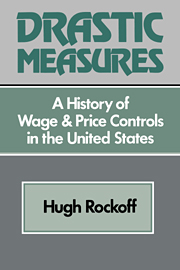Book contents
- Frontmatter
- Contents
- Editors' preface
- Preface
- 1 The debate over controls
- 2 Forgotten experiments
- 3 World War I
- 4 World War II: Attacking inflation directly
- 5 World War II: The market under controls
- 6 The Korean War
- 7 The Vietnam War
- 8 Lessons for the recent crisis
- Notes
- Bibliography
- Name index
- Subject index
- Frontmatter
- Contents
- Editors' preface
- Preface
- 1 The debate over controls
- 2 Forgotten experiments
- 3 World War I
- 4 World War II: Attacking inflation directly
- 5 World War II: The market under controls
- 6 The Korean War
- 7 The Vietnam War
- 8 Lessons for the recent crisis
- Notes
- Bibliography
- Name index
- Subject index
Summary
Prices mean the same thing everywhere now. They mean the efficiency or inefficiency of the nation, whether it is the government that pays them or not. They mean victory or defeat. They mean America will win her place once for all among the foremost free nations of the world, or that she will sink to defeat and become a second rate power alike in thought and action.
Woodrow Wilson, July 11, 1917To control prices in World War I the United States relied on a large set of agencies created ad hoc to deal with problems as they arose. Four of these organizations will concern us here: the War Industries Board, particularly its Price Fixing Committee; the Food and Fuel Administrations; and the Bureau of Industrial Housing and Transportation. In each case I will be concerned with the major questions raised in the debate over controls. Were controls evaded? Were shortages produced? Was rationing used? Did the system of regulations grow ever more complex and limiting? Did the introduction of controls cool the inflationary fever? Questions such as these, particularly the first four, must be answered on an agency-by-agency basis.
The Price Fixing Committee and the Food and Fuel Administrations were independent agencies responsible to the President, while the Bureau of Industrial Housing and Transportation was in the Labor Department. A measure of coordination was achieved through the “war cabinet,” which consisted of the chairmen of the War Trade Board, the War Industries Board, and the Shipping Board; the Food and Fuel Administrators; and the Director General of the Railroads.
- Type
- Chapter
- Information
- Drastic MeasuresA History of Wage and Price Controls in the United States, pp. 43 - 84Publisher: Cambridge University PressPrint publication year: 1984

